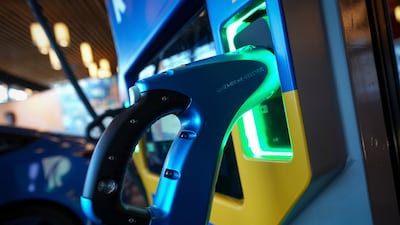Saudi Arabia's Public Investment Fund and Saudi Electricity Company have launched a new electric vehicle infrastructure company, which plans to set up 5,000 fast chargers across the kingdom by 2030.
The company plans to establish a presence in more than 1,000 locations across Saudi Arabia, in line with applicable regulations and standards, the PIF said on Sunday.
The PIF will own a 75 per cent stake in the new company, while SEC will hold the remaining 25 per cent stake.
The move is aimed at growing the local automotive ecosystem through collaboration with EV companies, the PIF said.
It also aims to promote private sector participation in the sector and support the localisation of research and development as well as the manufacturing of technologically advanced materials.
The new company will “spearhead the EV transition”, said Omar Al-Madhi, co-head of Mena direct investments at PIF.
“Through our partnership with SEC, we will be able to accelerate the creation of synergies across the EV supply chain, driving economic growth and diversification in line with Vision 2030, and positioning Saudi Arabia as a leader in the new electrified era of the automotive industry.”
The EV industry is growing amid the global shift towards sustainable transport.
The market is projected to grow more than threefold to about $1.6 trillion by 2030, from an estimated $500 billion in 2023, according to data from Fortune Business Insights.
Saudi Arabia, the Arab world's largest economy, is also focusing heavily on building its domestic EV market to support the transition and develop its local manufacturing sector as part of its Vision 2030 strategy to diversify its economy away from oil.
In November last year, the PIF launched the kingdom's first electric vehicle brand, Ceer, which aims to attract more than $150 million in foreign direct investment and create up to 30,000 direct and indirect jobs.
The new brand will design, manufacture and sell a range of vehicles, including saloons (sedans) and sports utility vehicles.
Ceer vehicles are expected to be available by 2025 and the company is projected to directly contribute $8 billion to Saudi Arabia’s economy by 2034.
Last month, luxury EV maker Lucid Group also said it opened its first international manufacturing plant in Saudi Arabia, which is expected to produce 155,000 electric vehicles a year.
The California-based company, which is backed by the PIF, has started assembly of its first luxury sedan – Lucid Air – at a factory near Jeddah.
The launch of the new EV infrastructure company is in line with the PIF’s strategy to expand Saudi Arabia’s “automotive capabilities to promote the country’s competitiveness on the world stage, and ultimately position it as a global leader”, the statement said.
The PIF, which is at the centre of the kingdom's diversification strategy, has established 89 companies since 2017.
The fund is focused on 13 strategic sectors and is mandated to pump $40 billion to $50 billion into the local economy annually to generate jobs and grow the non-oil economic base of the country.


